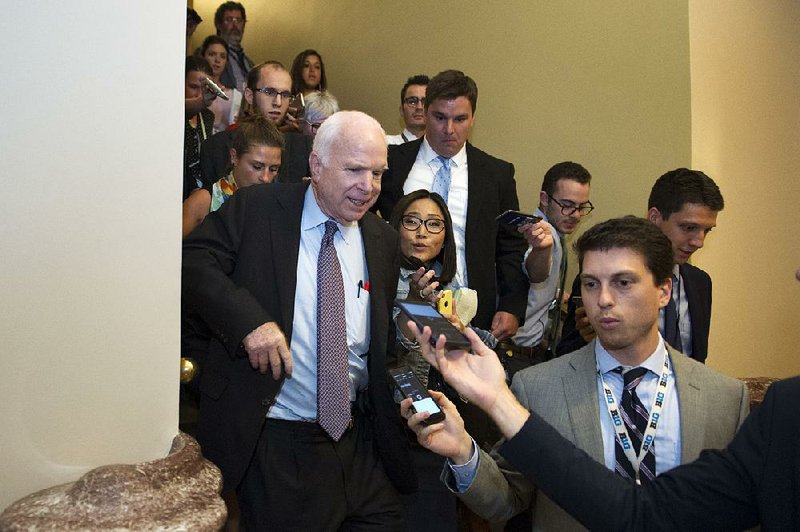WASHINGTON -- Hours after their seven-year pledge to dismantle the Patient Protection and Affordable Care Act hurtled off the rails in the Senate, Republican lawmakers pointed fingers at their own Friday for letting their voters down.
Just after midnight, the GOP-run Senate voted 51-49 to reject Majority Leader Mitch McConnell's last-ditch attempt to sustain Republicans' drive to dismantle President Barack Obama's health care overhaul with a trimmed-down bill. The vote, which concluded shortly before 2 a.m. Eastern time, was a defeat for President Donald Trump and McConnell, R-Ky., who have made uprooting the statute a top priority.
"They should have approved health care last night," Trump said Friday during a speech in Brentwood, N.Y. "But you can't have everything," he added.
Senate Democrats were joined in opposition by three Republicans -- Maine's Susan Collins, Lisa Murkowski of Alaska and Arizona's John McCain. The 80-year-old McCain, just diagnosed with brain cancer, had returned to the Capitol three days earlier to provide a vote that temporarily kept the measure alive, only to deliver the coup de grace Friday.
"3 Republicans and 48 Democrats let the American people down," Trump tweeted Friday. He tweeted later that the Senate needed a rules change to "immediately go to a 51 vote majority, not senseless 60," even though on the crucial vote a simple majority of 51 votes, including a tie-breaker by Vice President Mike Pence, was all that was needed.
"Hello, he only needed 51 in the health care bill and couldn't do it," Senate Minority Leader Charles Schumer, D-N.Y., reminded reporters.
Schumer, as well as House Minority Leader Nancy Pelosi of California, urged Republicans to abandon the push for a repeal and join them in patching up problems in the existing health law.
"Right now we go forward recognizing the value of the Affordable Care Act," Pelosi told reporters Friday. "But we also know that there are updates and improvements we need to make."
Several Republicans, stunned by Friday's action, lodged veiled criticism of Collins, McCain and Murkowski.
"I would never criticize anybody's votes, but I'm very disappointed," said Sen. David Perdue, R-Ga., a close Trump ally. "I think the self-interest is still alive in the Senate. I think it's time to put that aside and put the national interests first."
Perdue said he was encouraged to hear Schumer say early Friday that the Affordable Care Act is in need of serious changes, comments that compelled him to begin talking to Democrats about potential compromises.
Friday morning, House leaders resorted to singer Gordon Lightfoot to point fingers. They opened a House GOP meeting by playing The Wreck of the Edmund Fitzgerald, a ballad about the 1975 sinking of a freighter in Lake Superior. Lawmakers said leaders assured them it was meant as a reference to the Senate's flop.
Earlier in the week, defections sank two broad GOP efforts in the Senate to scrap the 2010 law. One would have erased Obama's statute and replaced it with a more constricted government health care role, and the other would have annulled the law and given Congress two years to replace it.
The measure that fell Friday was narrower and included a repeal of Obama's tax penalties on people who don't buy policies and on employers who don't offer coverage to workers.
But the week's setbacks highlighted how, despite years of trying, GOP leaders haven't resolved internal battles between conservatives seeking to erase Obama's law and moderates leery of tossing millions of voters off of coverage.
The House approved its health care measure in May, after its own tribulations.
In a statement, Speaker Paul Ryan, R-Wis., pointedly said "the House delivered a bill." He added, "I encourage the Senate to continue working toward a real solution that keeps our promise."
Rep. Mo Brooks, R-Ala., who is running for a Senate seat, faulted McConnell for not crafting a plan that could pass. He said that if McConnell abandons the health care drive, "he should resign from leadership."
One moderate Republican said Trump shared responsibility.
"One of the failures was the president never laid out a plan or his core principles and never sold them to the American people," said Rep. Charlie Dent, R-Pa. "Outsourced the whole issue to Congress."
Other representatives urged the Senate not to give up.
"They've got to keep voting," said Rep. Thomas Massie, R-Ky., who went on to suggest that Senate Republicans who stood in the way of the repeal should be removed at the ballot box.
"I think the voters need to do a little more sorting of the people who are serving up here," he said.
Bipartisan Call
Senators in both parties said they were ready to quickly begin work on a new plan.
"Maybe this had to happen to actually begin to have a conversation," said Sen. Bill Cassidy, R-La., who had tried and failed to broker a previous bipartisan compromise.
Sen. Lamar Alexander, R-Tenn., chairman of the Senate Health, Education, Labor and Pensions Committee that under normal circumstances would play a central role in crafting a new health care bill, said Friday's setback "leaves an urgent problem that I am committed to addressing."
In statements Friday, McCain said the Senate bill didn't lower costs or improve care and called the chamber's inability to craft wide-ranging legislation "inexcusable." He said Democrats and Republicans should write a bill together and "stop the political gamesmanship."
Schumer, too, said he hoped the two parties could "work together to make the system better" by stabilizing marketplaces.
But many conservatives oppose such payments and consider them insurance industry bailouts, raising questions about whether Congress could approve such a package.
Sen. Thomas Carper, D-Del., also said Congress needs "to turn the page and stabilize the exchanges." He said Democrats will push Congress to require the Trump administration to enforce the current individual and employer mandates and fully fund current cost-sharing arrangements.
The federal government is scheduled to spend roughly $7 billion this year, and $10 billion in 2018, to help pay for consumers' out-of-pocket health costs, but administration officials have not indicated if they will supply the funds after the end of this month.
"The governors have to speak out on this; they have been speaking out, and we need to listen," added Carper, a former governor. "The insurance companies themselves, too."
Sen. Amy Klobuchar, D-Minn., said bipartisan talks, should they occur, ought to also include plans to reduce the cost of prescription drugs.
"That is a steep lift, with the way pharma influences legislation in this town, but maybe this is the opening that we need," she said.
McConnell said it was time for Democrats "to tell us what they have in mind." Saying he was backed by most Republicans, he added, "Bailing out insurance companies, with no thought of any kind of reform, is not something I want to be part of."
Still, other GOP senators signaled they will oppose bipartisan talks.
"I don't think the Democrats have any interest in doing anything productive" on health care, said Sen. Ted Cruz, R-Texas.
"Republican senators are going to go home. They're going to hear from their constituents, and I don't expect the response to be muted," Cruz added.
Trump, meanwhile, reiterated his call to "let Obamacare implode."
Information for this article was contributed by Alan Fram, Erica Werner, Ricardo Alonso-Zaldivar and Stephen Ohlemacher of The Associated Press; by Matt Flegenheimer of The New York Times; and by Ed O'Keefe, Juliet Eilperin, Sean Sullivan, Kelsey Snell and Paul Kane of The Washington Post.
A Section on 07/29/2017

